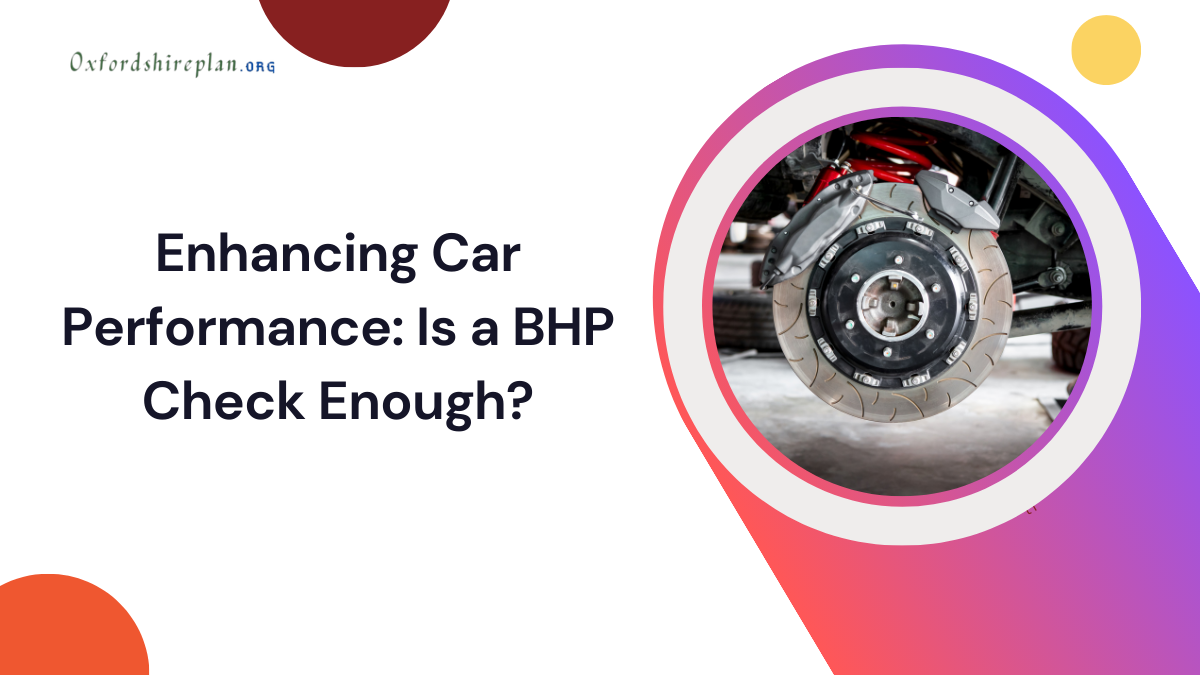When it comes to cars, performance is a key consideration for many drivers. Whether it’s the thrill of speed or the need to conquer challenging terrains, car enthusiasts and practical buyers alike seek ways to maximize vehicle power. One commonly discussed measure is the car’s Brake Horsepower (BHP), but is checking BHP enough to gauge a car’s performance?
This article explores the role of BHP in vehicle performance and dives into additional factors that contribute to a car’s overall capabilities.

Contents
Understanding Horsepower and BHP
What is Horsepower? Horsepower, developed by engineer James Watt, is a unit of power based on his observation that an average horse could perform 33,000 foot-pounds of work per minute. While initially unrelated to cars, horsepower became a standard measurement as engines were invented.
- Horsepower (HP): Refers to the engine’s raw power output without considering power losses.
- Brake Horsepower (BHP): Accounts for power losses from components like the turbocharger and drivetrain, providing a more accurate measure of usable engine power.
| Metric | Definition |
|---|---|
| HP | Engine’s raw power without any power losses |
| BHP | Usable power after accounting for friction and component losses |
How HP, BHP, PS, and KW Differ?
Several units measure a vehicle’s power, each used in different regions and contexts. Understanding these distinctions can clarify how cars are compared across markets.
- PS (Pferdestärke): Commonly used in Europe, PS is a metric horsepower, roughly equivalent to 735.5 watts.
- KW (Kilowatt): The international standard, widely used globally; 1 kW equals 1,000 watts.
- BHP (Brake Horsepower): Measures usable engine power, typically used in the U.S. and U.K.
| Unit | Region | Equivalent |
|---|---|---|
| PS | Europe | 735.5 watts |
| KW | Global | 1,000 watts |
| BHP | U.S., U.K., influenced by British systems | Engine power minus losses |
Additional Performance Factors Beyond BHP
A car’s performance is about more than just BHP. Here are key factors that also influence performance:
- Torque
- Measures the engine’s rotational force, crucial for acceleration and towing.
- Higher torque improves quick acceleration and handling under heavy loads.
- Weight
- Heavier cars need more power to accelerate at the same rate as lighter ones.
- Impacts fuel efficiency, handling, and braking distance.
- Aerodynamics
- Cars with efficient aerodynamics experience less air resistance, enhancing fuel economy and top speed.
Other Influential Factors
- Transmission: Gear ratios impact acceleration and fuel efficiency.
- Suspension: Affects ride quality and handling.
- Power-to-Weight Ratio: BHP per kilogram offers a relative measure of a car’s performance potential.
Why Checking BHP is Useful?
Checking your car’s BHP offers insights into its power potential and acceleration capabilities. For many drivers, BHP provides a valuable benchmark of engine strength, especially when comparing models for purchase. However, to get a well-rounded view of vehicle performance, additional factors like weight, torque, and aerodynamics should be considered.
Reasons to Check Your Car’s BHP:
- Understand Engine Power: BHP provides an idea of a car’s raw power output.
- Gauge Driving Experience: Higher BHP often translates to faster acceleration.
- Informative for Buyers: Helps prospective buyers understand if a car meets their power expectations.
How to Check Your Car’s BHP: A Quick Guide?
- Visit a BHP checker website.
- Enter the car’s registration number.
- Receive a report with BHP details and other engine specifications.
Is a BHP Check Enough for Evaluating Performance?
A simple BHP check doesn’t provide the full picture. For an accurate assessment, consider additional metrics like torque, body type, and weight. Comprehensive vehicle reports typically include:
- Engine Specs: BHP, torque, and KW power details.
- Fuel Type: Optimizes performance based on fuel compatibility.
- Gear Ratios: Helps understand car behavior at various speeds.
By combining BHP with these metrics, drivers can make informed choices about a car’s suitability for their needs and lifestyle.
| Performance Aspect | Description |
|---|---|
| Engine Specs | Includes BHP, torque, KW for complete power understanding |
| Fuel Type | Helps determine the optimal fuel type for engine efficiency |
| Gear Ratios | Affects acceleration, fuel economy, and driving dynamics |
Conclusion: Maximizing Your Car’s Performance
While checking BHP is essential, exploring a car’s other performance factors will provide a holistic understanding of its capabilities. Before making a decision, consider a comprehensive car report that covers all these metrics.
Get your BHP check today and explore all the factors to find your ideal car!
Click here to learn more

I am a dedicated lifestyle and fashion enthusiast, always looking for the latest trends and timeless styles. With a flair for creativity and a passion for self-expression, I provide fresh insights and tips on elevating everyday living and personal style.
















